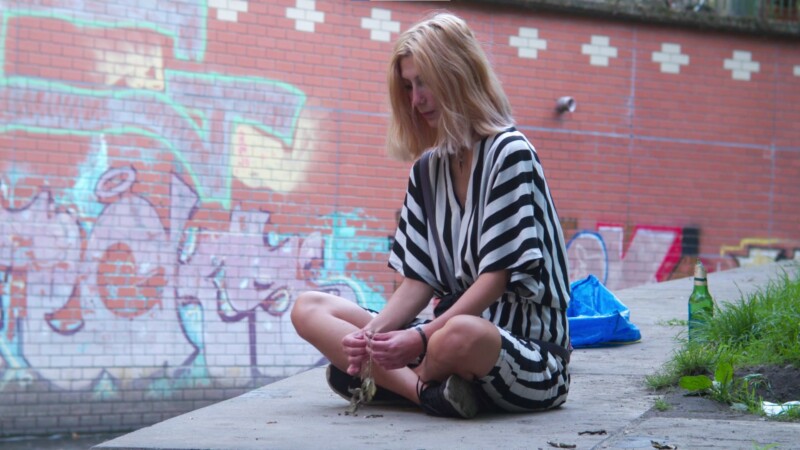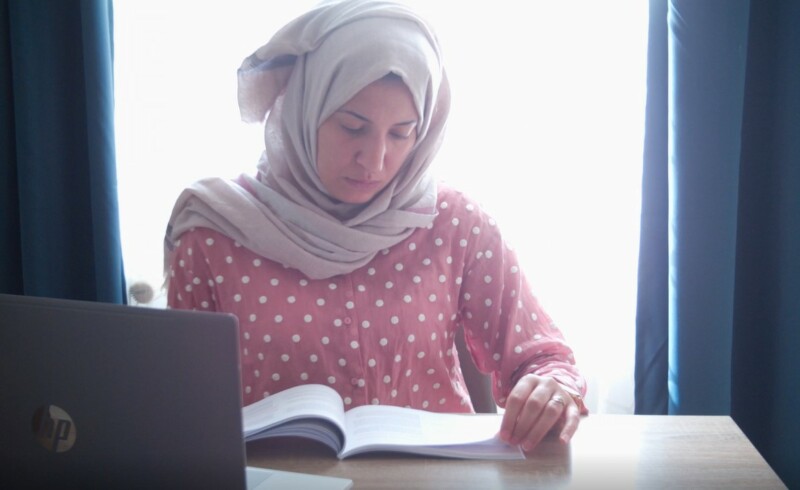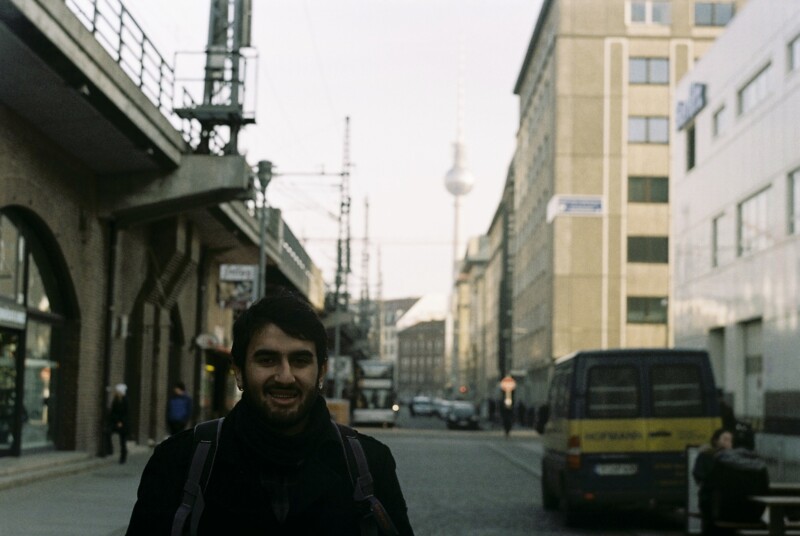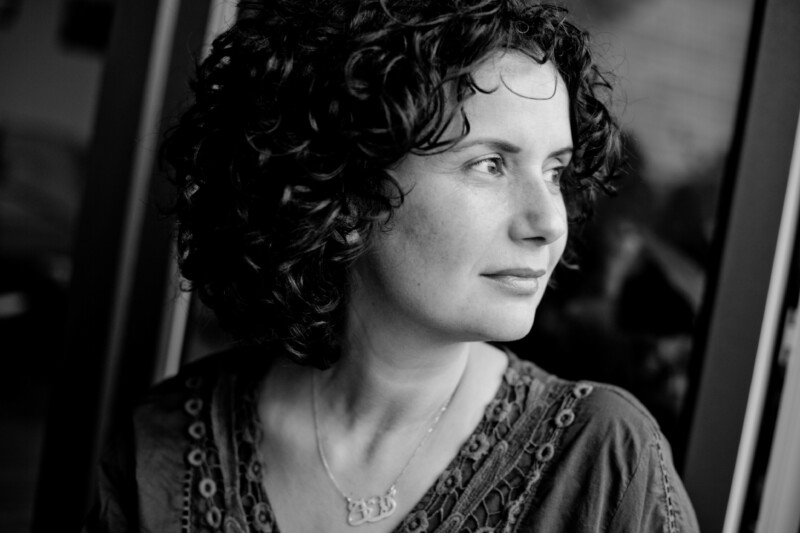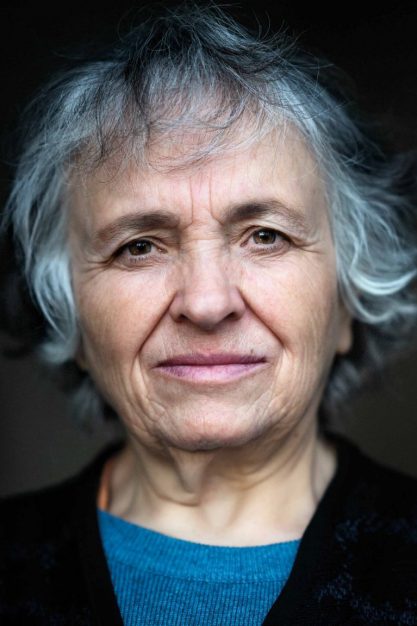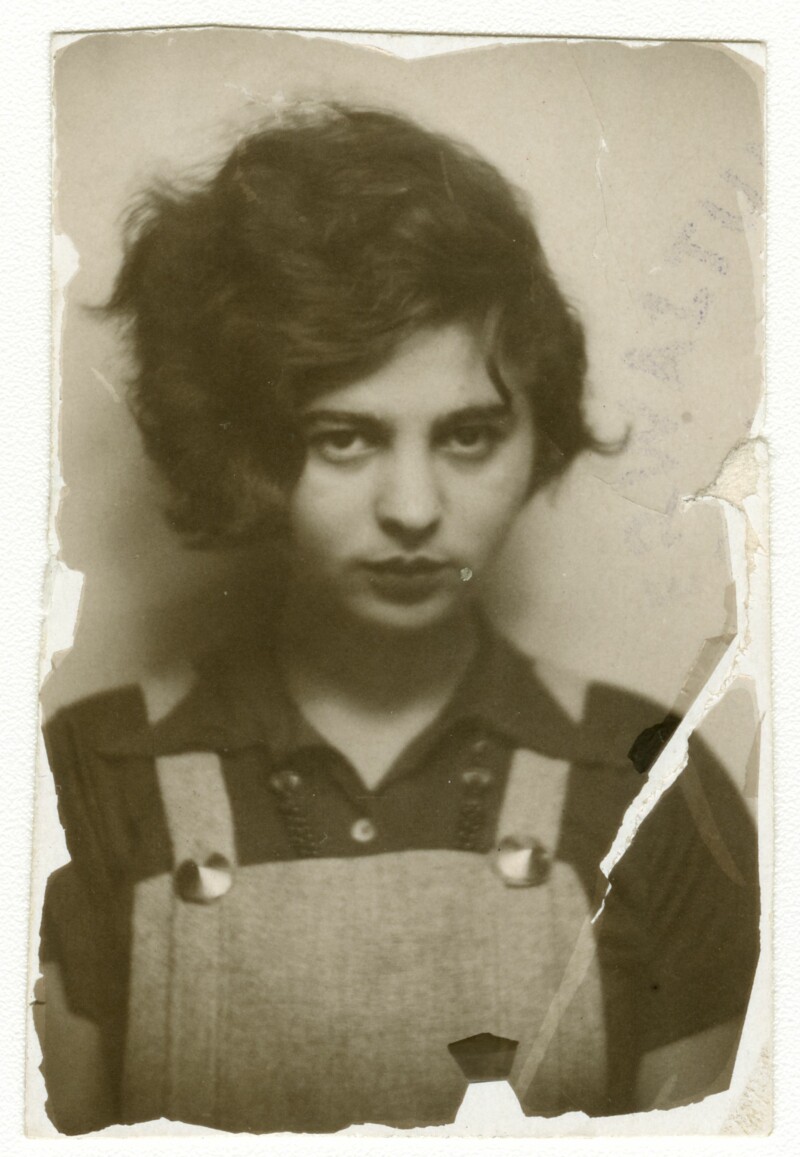
Sie haben uns ein Ticket gekauft und ich bin mit meinem Mann nach Leipzig gegangen. Dort sind wir mehr als ein Jahr geblieben. […] Wir waren nicht in der Stadt, sondern in einem kleinen Dorf. Aber das war nicht so eine tolle Erfahrung, denn ich war ein Witz zwischen den Menschen im Dorf. Sie lachten immer über uns, zeigten auf uns und so. Ich glaube, sie hatten noch nie eine Frau mit Kopftuch gesehen. Ich war die Einzige. Zuerst haben wir in einem Aufnahmelager gewohnt, dann haben sie uns eine Wohnung gegeben, als wir den Aufenthalt[stitel] bekommen haben. Sie haben gesagt: ‘Flüchtling’, ‘Bist du arabisch oder was?’ Mein Deutsch war auch nicht sehr toll, ich habe nur zuhause Deutsch gelernt, weil die Schule eine Stunde mit dem Zug entfernt war. Hier in Berlin ist eine Stunde normal, aber auf dem Dorf ist es schwer, weil der Bus nur einmal in der Stunde kommt und der Zug auch. Wenn er weg ist, warte ich drei Stunden auf der Straße. […] Das war eine schwierige Zeit: Man sieht keine netten Menschen. Auch wenn wir einkaufen gingen, sahen sie mich komisch an. In Berlin ist es besser für mich, weil es Multikulti ist.
Ich möchte aber auch über eine Erfahrung sprechen, die ich in Berlin gemacht habe. Das war wirklich ein Stoß für mich. Ich habe mich bei einer Bank in Berlin für eine Ausbildung zur Bankkauffrau beworben. Sie haben mir eine Einladung zum Bewerbungsgespräch geschickt. Als die Mitarbeiterin mich das erste Mal gesehen hat, war sie überrascht – ich weiß nicht, warum, vielleicht wegen des Kopftuchs. Sie haben mich nicht begrüßt; ich habe meine Hand ausgestreckt und sie hat gesagt: ‚Jetzt nicht, wenn du gehst‘. Die ganze Zeit haben sie mir Fragen gestellt, die nichts mit der Arbeit zu tun haben: ‚Hast du Freunde in Berlin? Wo gehst du mit deinen Freunden hin? Was machst du mit deinen Freunden?‘ Sie haben mir eine Prüfung gegeben, und ich habe die ganze mathematische Prüfung gemacht. Und nach dem Bewerbungsgespräch sagten sie: ‚Die Ausbildung ist nur für Deutsche und du hast keine Persönlichkeit. […] Du solltest in der Kita arbeiten.‘ Dabei kann ich mit meinen Zeugnissen gar nicht in der Kita arbeiten, weil ich keinen Abschluss dafür habe, und ich für die Kita Zeugnisse brauche. […] Nach dieser Erfahrung habe ich eine Psychotherapie gemacht. Denn ich war am Anfang sehr begeistert, dachte, ich spreche Deutsch und kann es schaffen. Danach war ich so enttäuscht. Sie hat mich nicht mal begrüßt, dabei ist eine Begrüßung doch der erste Schritt.
Ich mag es nicht immer zu sagen: Die anderen haben Schuld. Vielleicht habe ich etwas gemacht, dass ich nicht so gemeint habe, vielleicht haben sie mich missverstanden. Aber ich mag es nicht, immer diese Rolle zu spielen: Die Rolle des Opfers. Ich verstehe es einfach nicht. Wenn jemand mir nichts antut, wieso sollte ich ihn dann hassen? Aber ich denke, dass es eine gute Erfahrung für mich ist. Nicht alle lieben mich. So ist das.
Ein Mensch bedeutet: Viele Erfahrungen, viele Gedanken, viele Gefühle. Wenn sie sagen, dass jemand Flüchtling ist, bedeutet das, er ist arm, er hat kein Geld, er hat keine Zeugnisse oder diese sind weniger wert als in Deutschland. Es gibt viele Vorurteile, das habe ich gespürt. Wenn jemand diese Gedanken über Flüchtlinge hat, sollte er mit ihnen sprechen, und danach kann er ein Urteil treffen.
Das Interview mit Alaa Muhrez wurde am 30.06.2020 vom We Refugees Archiv in Berlin durchgeführt.
They bought us a ticket and I went to Leipzig with my husband. We stayed there for more than a year. […] We were not in the city, but in a small village. But that was not such a great experience, because I was a joke between the people in the village. They were always laughing at us, pointing at us and stuff. I don’t think they had ever seen a woman wearing a headscarf. I was the only one. First we lived in a reception camp, then they gave us an apartment when we got the residence [title]. They said: ‘Refugee’, ‘Are you Arab or what?’ My German wasn’t very good either, I only learned German at home because the school was an hour away by train. Here in Berlin one hour is normal, but in the village it is hard because the bus comes only once an hour and the train too. When it is gone, I wait three hours on the street. […] That was a difficult time: you don’t see nice people. Even when we went shopping, they looked at me strangely. It’s better for me in Berlin because it’s multicultural.
But I also want to talk about an experience I had in Berlin. It was really a pushback for me. I applied to a bank in Berlin for an apprenticeship as a bank clerk. They sent me an invitation for a job interview. When the employee saw me for the first time, she was surprised – I don’t know why, maybe because of the headscarf. They didn’t greet me; I stretched out my hand and she said: ‘Not now, when you leave’. All the time they were asking me questions that had nothing to do with the work: ‘Do you have friends in Berlin? Where do you go with your friends? What do you do with your friends?’ They gave me an exam, and I did the whole mathematical test. And after the interview they said: ‘The training is only for Germans and you don’t have a personality. […] You should work in a kindergarten.’ But I can’t work in a kindergarten with my certificates because I don’t have a degree and I need certificates for the kindergarten. […] After this experience I did a psychotherapy. Because I was very enthusiastic at the beginning, thought I spoke German and could do it. Afterwards I was so disappointed. She didn’t even greet me, although a greeting is the first step.
I don’t always like to say: The others are to blame. Maybe I did something that I didn’t mean, maybe they misunderstood me. But I don’t always like to play this role: The role of the victim. I just don’t understand it. If someone doesn’t hurt me, why should I hate him? But I think that it is a good experience for me. Not everybody loves me. That’s how it is.
One person, that means: many experiences, many thoughts, many feelings. When they say that someone is a refugee, it means that he is poor, he has no money, he has no certificates or these are worth less than in Germany. There are many prejudices, I have felt that. If someone has these thoughts about refugees, they should talk to them and then they can make a judgement.
The interview with Alaa Muhrez was conducted by We Refugees Archive in Berlin on June 30, 2020.
In the wake of the war in Syria, Alaa Muhrez and her husband fled to Egypt in 2013. After Abdel Fatah El-Sisi became president there in a coup d’état, the problems for refugees intensified: It became more and more difficult to find work, so Alaa and her husband decided to go to Germany. From Egypt to Italy, she and her husband went by a small boat with 400 other people on it. They changed the boat several times. “If you got up, you couldn’t sit down again,” explains Alaa, that’s how crowded it was. After the dangerous journey, they arrived in Catania, Sicily. There their personal details were recorded. They knew that it could be difficult to apply for a residence permit in Italy to continue their journey without waiting for their papers to be recorded.
They arrived in Austria by plane and from there to Munich. From Munich they were brought to Leipzig, and they were assigned an apartment in a nearby village. After more than a year, they came to Berlin, where after some time they found an apartment and work. Alaa reported many experiences of discrimination which she had to endure there.
The interview with Alaa Muhrez was conducted by We Refugees Archive in Berlin on June 30, 2020.
Translation from German into English © Minor Kontor.
